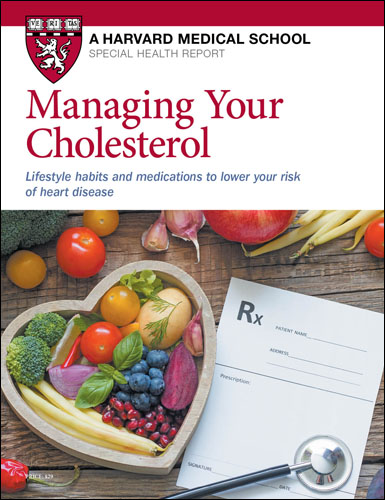Harvard study: High olive oil consumption associated with longevity
News briefs
 Olive oil is part of a healthy, plant-based Mediterranean-style diet. And a Harvard study published Jan. 18, 2022, in the Journal of the American College of Cardiology suggests that high olive oil consumption — especially when olive oil replaces butter, margarine, or mayonnaise — is tied to a longer life span. Researchers pooled the results of two large Harvard studies (the Nurses' Health Study and the Health Professionals Follow-up Study) that included more than 92,000 healthy men and women in the United States who reported details about their health and dietary habits every two years. The scientists found that people who consumed the most olive oil — a little more than half a tablespoon per day — had a 19% lower risk of death from any cause over a 28-year period, compared with those who rarely or never consumed olive oil. Higher olive oil consumption was also associated with lower risks of death from cardiovascular disease, cancer, neurodegenerative disease, or lung disease. Among people who replaced butter, margarine, or mayonnaise with olive oil, the death rate was as much as 34% lower than that of people who didn't substitute olive oil for those fats. The study was observational and doesn't prove that olive oil lengthens life. But other studies have found a link between olive oil consumption and reduced risks of cardiovascular disease. Researchers speculate that olive oil's anti-inflammatory and antioxidant properties may play a role in protecting health.
Olive oil is part of a healthy, plant-based Mediterranean-style diet. And a Harvard study published Jan. 18, 2022, in the Journal of the American College of Cardiology suggests that high olive oil consumption — especially when olive oil replaces butter, margarine, or mayonnaise — is tied to a longer life span. Researchers pooled the results of two large Harvard studies (the Nurses' Health Study and the Health Professionals Follow-up Study) that included more than 92,000 healthy men and women in the United States who reported details about their health and dietary habits every two years. The scientists found that people who consumed the most olive oil — a little more than half a tablespoon per day — had a 19% lower risk of death from any cause over a 28-year period, compared with those who rarely or never consumed olive oil. Higher olive oil consumption was also associated with lower risks of death from cardiovascular disease, cancer, neurodegenerative disease, or lung disease. Among people who replaced butter, margarine, or mayonnaise with olive oil, the death rate was as much as 34% lower than that of people who didn't substitute olive oil for those fats. The study was observational and doesn't prove that olive oil lengthens life. But other studies have found a link between olive oil consumption and reduced risks of cardiovascular disease. Researchers speculate that olive oil's anti-inflammatory and antioxidant properties may play a role in protecting health.
Image: © baibaz/Getty Images
About the Author

Heidi Godman, Executive Editor, Harvard Health Letter
Disclaimer:
As a service to our readers, Harvard Health Publishing provides access to our library of archived content. Please note the date of last review or update on all articles.
No content on this site, regardless of date, should ever be used as a substitute for direct medical advice from your doctor or other qualified clinician.
















